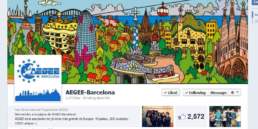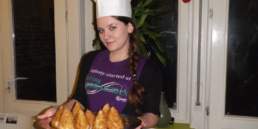
Being in the European board of AEGEE, the CD, was a unique experience for Thomas Leszke and Mirosław “Mirek” Krzanik. The former Projects Director (Thomas) and the Vice-President and External Relations Director (Mirosław) experienced successes and challenges. Yet however difficult the tasks were, the spirit of their CD was very strong. The Golden Oldie spoke with Thomas and Mirosław about their CD time and their new life.
Golden Oldie: Where do you live right now?
Thomas Leszke: I’m back in Köln, where I used to study before.
Mirosław Krzanik: After a year in Brussels I thought that it is not the time to go back to Poland and I moved to Maastricht in the Netherlands.
Golden Oldie: What are you studying/working/doing now?
Mirosław: I started my master’s degree, doing Research Master European Studies.
Thomas: I am doing my last year of studies in Political Science, Music and Linguistics. Don’t ask how it works; it doesn’t.

Golden Oldie: What are you most proud of regarding your work in the CD?
Mirosław: I guess to see that people trusted us. And the fact that now on the European level we see more and more fresh faces, who are willing to contribute, make a change. Of course there is something cool about the fact that AEGEE didn’t go bankrupt when I was earning money for it!
Thomas: I don’t want to seem too thoughtful or even gloomy, but I must admit that I cannot feel pride when I look back at my year. Those things that I really wanted to achieve, I haven’t: the Working Groups reform and revival, founding new projects, making a valuable contribution to our thematic work. But I do look back in gratitude and definitely without regret, because of all the friends I made and all the things I learned.
Golden Oldie: What was your best personal memory about your term in the CD?
Thomas: Our CD team spirit at statutory events, especially Spring Agora Alicante 2011. And the joint birthday party of Michael, Alla and me in October 2010, which was awesome!
Mirosław: There are many great memories so it is hard to choose one. However, I liked in particular the EBM Riga. It was nice to see a lot of appreciation but at the same time even more willingness to work from everybody out there.
Golden Oldie: What was your worst experience of that year?
Mirosław: Well… I shared my bedroom, for the first time in my life. And it was absolutely awful…
Thomas: There is one very bad moment, and one disappointing general fact, that cannot be really compared to each other: First, being unable to defend my position about the Working Groups reform at the closing plenary of the Autumn Agora Istanbul 2010, where I had simply over-spent my energy. Second, realising my failure in doing what I had actually hoped to do as the Projects Director: reading and discussing a lot about Europe, inspiring our members, winning their enthusiasm for these topics, and creating new and promising thematic initiatives in AEGEE. An important factor here was the overwhelming administrative burden which I had not expected, but the disappointing element in this story is that I soon lost my own enthusiasm and could not manage to shrug off the administration in order to reach my goals, something that would have been possible if I had shown more determination.

Golden Oldie: CD means also intercultural experience. What habit/custom/attitude did you lean from others, what did they learn from you?
Thomas (smiling): I learned to speak very ungrammatical English. In fact, all of us were already very internationalised when we came to Brussels, and most of the things that I learned are not of a specific cultural nature, but rather have to do with individual personalities. However, I believe that I managed to convince all my team and many more people around me of the priceless advantages of using a bicycle instead of public transport.
Mirosław: I’ve learnt something from every single person in the house. Starting from culinary customs, like eating in the middle of the night food without spices cooked out of no meat – distinguish national and personal influences yourself. Then to mention working styles with some people spamming my mailbox between 2 and 4 a.m. Yes, in the morning, when I was asleep. Coming to travelling habits, when I had an opportunity how not to carry 20 kilos of cloths for a weekend – though, that reached extremes with carrying no sleepingbags or mattresses and towels. What could they learn from me? Maybe our traditional Polish customs… And to some extent how to survive living together while being born not to love people at first.
Golden Oldie: What was your favourite meal in the CD house? And who was the best cook?
Mirosław: I would cast my vote for Alfredo, or maybe Alfredo and his mother’s recipes. But the meal I will remember the most will be obviously chicken legs, with potatoes and salad – that came only sometimes.
Thomas (smiling): Difficult to say. Thankfully, all of us had decent cooking skills, so we only suffered when we had guests cooking. Probably Michael and Alfredo were the best cooks.
Golden Oldie: Who was the heart or good soul of the CD?
Thomas: Again, difficult. Our heart would probably be Manos, who always looked after everybody’s wellbeing and systematically tried to help others with their work. The good soul of the CD… I have three candidates: Alla, for being our mother and admirably taking care of many things that others were not able to keep track of; Alfredo, for being always sunny and spreading good mood in the most stressful situations; Michael, for being our best listener and most diplomatic discusser.
Mirosław: I guess there were moments when each one stepped, maybe except of me, in the role of a “good soul” supporting the others. But traditionally it was Alfredo I guess.
Golden Oldie: Did the year in Brussels change you? If yes, in what way?
Mirosław: It did! It made think about Europe not as a state of the art, being there and governing its citizens, but as a goal we all have to work for. And that also made me studying what I’m studying now. And I became much more patient.
Thomas: I learned many things from my friends in the house, and I think I emerged as quite a different person. I greatly developed my sense of professionalism, which had always been a weakness of mine, even though I may appear all the contrary in public. I learned to organise myself, I learned to administer whatever needs to be administered, and I learned many, many small lessons about intercultural diplomacy.
Golden Oldie: How hard was it to adjust to “normal” life?
Mirosław: Not very hard. Took me around 7 minutes.
Thomas: No problem at all. It went all perfectly natural, surprisingly.
Golden Oldie: Are you still involved in AEGEE? In what way?
Thomas: I am having two proposals at the upcoming Autumn Agora Skopje 2011. I am helping out in my Local, AEGEE-Köln, which is still kind of my inner circle here. I might do this or that on our European level as well in the future, depending on my time and on the tasks that are available. But I have no concrete intentions at the moment. The most attractive thing is maybe preparing the next EBM, for which we have great plans!
Mirosław: I do what I consider being my best contribution to AEGEE, the way I can help it the most. Last year i worked with European youth Forum YFJ and I continue that now being a Liaison Officer. i hope it will make us even more recognisable!
Golden Oldie: When will you retire from AEGEE and join Les Anciens?
Mirosław: Give me some time, I’m still considerably young!
Thomas: Qué será, será…
Golden Oldie: Will you come to the Agoras in Skopje and Enschede?
Thomas: Definitely.
Mirosław: To Skopje unfortunately won’t make it, but Enschede is just couple of hours away from here. I guess I will be there – if the local organisers promise me: no tents!
Golden Oldie: If you could give your CD team a grade from 1 (very bad) to 10 (excellent) what would that be?
Mirosław: I would be dumb to grade myself any lower than 10.
Thomas: Something rather high, but lower than 10. We had our shortcomings that are obviously related to the fact that we were eight very different personalities from eight different countries. We were not always able to discuss constructively, there were always too many different points of view that sometimes conflicted and did not allow a quick and convenient solution. But all of us have overcome a lot of internal borders, all of us have spent a lot of energy on improving ourselves, and in the end, our disagreements were minor. What made me very happy was our mutual and unconditional solidarity in those moments when we acted as a team in public, for example at statutory events, and I believe that this has earned us a lot of appreciation in the network.
Read also these interviews:


